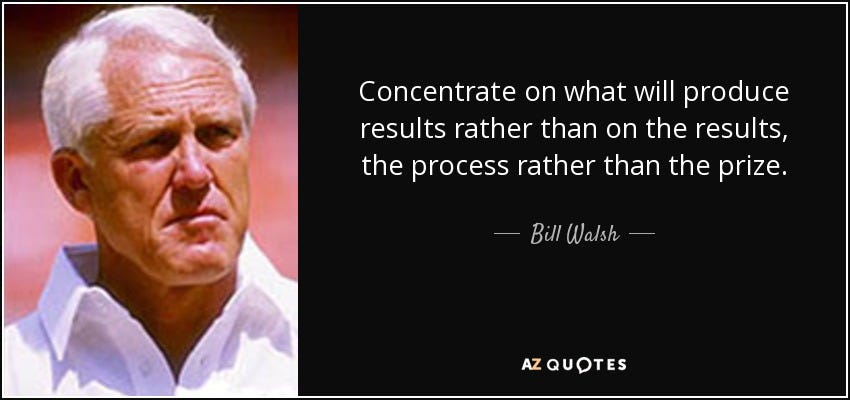Control the controllables.
Diving deep in response to anxiety, vs letting the score take care of itself
Kiko Matthews is a professional adventurer. In 2018, she became the fastest woman to row single-handed across the Atlantic, in just over 49 days. To make life even harder, she was in the middle of recovering from brain surgery, after having a tumour removed. She’s an extraordinary and inspiring human.
I listen to a lot of podcasts. Normally my work-relevant learnings come from business and tech podcasts. But a few weeks ago, something Kiko said on a travel podcast that I love, Armchair Explorer, stuck in my head. Discussing whether she was worried about capsizing in 40ft waves, getting lost, or being attacked by sharks, Kiko said:
“In every situation where you're stressed you have to stop, think about it, ask ‘can I control any of this?’, no, ok you've got to let it go... I wish I used that more and more in my day now. Control the controllables, live your life, and remember the purpose - why I'm doing it.”
Sometimes the most profound statements are the most simple. This one has been echoing around my head since I listened to Kiko’s story. The two concepts of “controlling the controllables” and “remembering the purpose” are messages for anyone working on something ambitious, whether athelete, founder, designer, developer, intern. The whole episode is well worth a listen, but that segment helped me think about work anxiety, diving deep into details, and the role of CEO in a new light.
Diving deep as a response to anxiety
When things are not going to plan, I feel anxious. This is a normal reaction for anyone in a position of responsibility. I am lucky enough to live with stable mental health and generally low anxiety levels, but worry and anxiety are the body’s natural responses to uncertainty, which is the currency of startups.
There are many examples of when things don’t go to plan in every startup. That’s the nature of the game. I tend to feel anxious in two particular scenarios:
Something concrete is going wrong (we miss a target / a team are not working productively)
Things seem to be going fine but something is niggling at me, and I can’t put a finger on what it is
My tendency in these situations is to dive deeply into data to try to figure out the ‘why’ for (1), or the ‘what’ for (2). I find comfort in data. I should say that I do not proactively try to do this, it’s simply in my nature. I am very interested in detail and data, and absorb data and information quickly. This is a strength of mine that I wish to use effectively.
Amazon’s Leadership Principle of ‘Dive Deep’ therefore speaks to me. Is it fool’s gold, though? As readers of my last piece will know, I perceive Jeff Bezos to be a “virtual mentor”. Bezos dives very deep and has a granular understanding of many parts of the gargantuan empire that Amazon has become. As (outgoing) CEO of Amazon, Bezos’s “dive deep” mentality appears in two guises. The first, and most positive, is setting an extremely high bar for his team. Because Bezos can dive deep into financials, data, or customer feedback, he holds that bar for all team members, and challenges hard where that capacity for depth was missing. I try to emulate this, and perceive it as positive.
However, while listening to Brad Stone’s second book on Amazon recently, it struck me that Bezos’s approach to depth has a negative side: internally, he was termed the “über-Product Manager” on new products, meticulously overseeing and modifying product specs and design features. I suspect that this is a damaging behaviour, and, while many of Amazon’s products have been great successes, the many failures have often been über-PM’d by Bezos.
I do not dive deep to this über-PM level. I suspect members of my team who read this will correct me with various examples (please do!), but I tend to stay out of the meticulous product detail. I do, however, continue to dive deep into tactics, strategic decisions, and ideas across the business. This develops both my understanding of the intricacies of our tactics and challenges, and builds my empathy for each team and their individual challenges. However, it does have negative consequences.
The risk of diving deep
The first danger of diving deep is that I circumvent the structure I’ve built to enable us to scale. When I dive deep, there is some part of me sub-consciously saying “I am needed to help solve this”, despite us having hired lots of people precisely because we believe they can solve it without needing to rely on the ultimate bottleneck, the CEO. This blocks me, and those team members, from fulfilling their potential and growing to the next level. What’s more, my solution in any given situation will almost certainly be less good than that of the more intelligent, creative person who joined us to work on exactly those problems, so there’s a good business argument for me not to dive deep into tactics.
The second danger of diving deep is that it means investing a lot of time into trying to explain - or justify - the present situation using inferences from the past, rather than focusing on planning for the future, informed by a zoomed-out serving of data delivered by the relevant teams. I’ve been given the feedback by my team that in periods of uncertainty, I pull the group down too deep into the detail, rather than upward into strategic implications and decisions. I think that in those moments I’m trying to build a meticulous shared mental map before proceeding to plot a direction. I’m trying to get everyone to the same starting point. This is sometimes useful, but at times my map scale is too zoomed in. Kiko couldn’t have crossed the Atlantic with a meticulous nautical map of Plymouth Harbour. Moreover, the base expectation should be that team members enter the room knowing the map well already, or have a memo to start the meeting to achieve that shared starting point (…another Amazon practice).
What’s more, there are plenty of cognitive biases that this details-first thinking is at risk of falling prey to. If you share this tendency, I’ll just leave a few links here:
Availability heuristic - we overweight factors that we remember vividly or have recently observed
Narrative fallacy - which often results in discernable causation and linear narratives to past events to make the story coherent
Insensitivity to sample size - looking at a small but salient collection of data points without a sufficient sample (i.e. diving deep into data) leads to prevalence of the two biases above above rather than statistical robustness
I have read my fair share of thinkpieces and books about cognitive biases, yet I fall victim to them all the time. That’s normal. I suspect people who claim to have overcome cognitive biases are the same people who claim to not be affected by advertisements. Pull the other one.
This has led me to a new way of thinking about Amazon’s ‘Dive Deep’ principle. It’s critical to be able dive deep, and everyone should be a skillful diver. I will hold my team to that standard. However, the CEO (and after a certain scale, the whole leadership group) should not swim deep - they should return swiftly to the surface, and remain there most of the time, informed by the highly effective divers in their teams. This level of detachment is not an expression of disinterest, arrogance, or power. It is the detachment required to create the optimal conditions for more objective debates, first-principles thinking, and less biased decision-making.
As my colleague put it to me in a piece of well-worded feedback, “diving deep should be the exception, not the rule.” The process of scaling as a CEO is like being a snake, constantly shedding old skins to let new ones take their place: at the start, first doer, then first PM, then first manager, then first Head of Function X, and so on. Diving deep can feel very comfortable, because it’s like returning to an old skin, instead of letting the new one grow.
Control the controllables
The temptation with data is that you can dive down endless rabbit holes. Exploring details and data are the geek’s equivalent of playing Candy Crush, providing endless dopamine hits of interest and intrigue. For me, it does sometimes yield a better answer - but usually it just distracts from the core problem.
The obvious but important thought that I’ve been mulling is that the data I dive deeply into are the outcomes, the uncontrollable lagging indicators, of the thing I should be putting most of my energy into - the controllable inputs. This idea is expressed repeatedly and eloquently by legendary NFL coach Bill Walsh in ‘The Score Takes Care of Itself’, which I began reading last week. Walsh’s philosophy, which carried the San Francisco 49ers to 5 Super Bowl victories, was to “concentrate on what will produce results rather than on the results, the process rather than the prize.”
As I explored in Asset Allocator in Chief, in Practice, the CEO (and whole company’s) job is to place a group of resource bets with different weightings. Spread the chips too thinly, and no progress will be made on what matters. I think I can apply the same mindset to mental energy. If I’m placing 50% of my mental energy chips into exploring the details, unpacking the ‘score’ and trying to individually assess the ‘why’, then only 50% is left to focus on the inputs that create that score. The score will be worse as a result. This is true both in victory and defeat. To return to Walsh, “If things are going well people will be elated and lose focus; if things are going poorly people are likely to be despondent and start looking for the exit. Consistent effort is a consistent challenge.” Focusing 50% of one’s energy on celebrating, ruing, or unpacking the score, high or low, detracts from focus on the controllables that create, maintain or extend success.
For a CEO, after a certain point of scale, those variables seem to consolidate. The job of the CEO is:
To set and communicate an inspiring vision
To set and communicate a focused strategy
To hire a dedicated team, assess them regularly, and manage them effectively
It’s extremely difficult, but sounds so simple. Those are my controllables. The CEO cannot control the score, nor can she sustainably pull each individual lever or manage specific projects happening to affect that score. The paradox of running a team is that you are in charge, but not in control.
Previously, when feeling anxious about team or company performance, I would dive deep into the data, expending energy on finding a why. Thanks to Kiko, Bill, and long conversations with my coach, my mental model is changing. Going forwards, I will endeavour to pour most of my energy into analysing, preparing for, and performing against those 3 controllable variables, and let the score take care of itself. It’ll be most tested at times - and every company has such times - when things are not going to plan. I’ll let you know how I get along.


